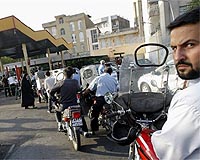 |
Washington (AFP) Aug 16, 2010 Louisiana's first shrimping season since hundreds of millions of gallons of toxic crude spewed into the Gulf of Mexico opened Monday, but few boats took to the water and some found oil, while fears lingered that no one will buy the shrimp anyway. Before the world's largest ever maritime oil spill, nearly three-quarters of US wild shrimp come from the Gulf of Mexico, which also contains major crab fishing and oyster grounds. The fishing industry is also a way of life for coastal communities, many of them Vietnamese and Cajun families now left wondering if the shrimp will still be there and if they are will consumers see them as safe to eat. "We got four boats that went out -- out of 1,400 -- and I'm hearing they're finding oil," Dean Blanchard, the largest shrimp wholesaler in the United States told AFP by phone from Grand Isle, Louisiana. "They drag, they find oil, they throw the stuff back in, and they're looking for cleaner waters." Ewell Smith, executive director of the Louisiana Seafood Promotion Board, said the state's commission of wildlife and fisheries opened the August shrimp season on schedule at 6:00 am (1100 GMT) Monday. "NOAA, FDA, EPA -- all those groups have given us a clean bill of health as far as the waters that are open," said Smith, referring to the National Oceanic and Atmospheric Administration, the Food and Drug Administration and the Environmental Protection Agency. "Nearly all state waters are open -- we're close to 90 percent open including part of Barataria Bay," a key shrimping ground, Smith added. But Blanchard estimated that only around 50 boats out of Louisiana's fleet of around 5,000 had taken to sea for the start of the four-month shrimping season, although it was impossible to confirm the number. Many Louisiana fishermen were still working on the clean-up effort, for which they get paid by BP. "You still see more boats with booms hanging on them than you do nets," fisheries activist Margaret Curole told AFP. "The fishermen aren't going to jeopardize that BP check to go out and look for shrimp that isn't there." One shrimper, Oliver Danos, said he was working with BP on the clean-up out of Leeville, Louisiana and had no immediate plans to go out shrimping. Blanchard said shrimpers who do go out will continue to drag until the season ends in mid-December, even if they come up with more oil than shrimp. "When the next crop comes in, when the babies and larvae come to eat and the oil is sitting on top of the plankton and nutrients on the bottom that feed everything, we're going to have serious problems. So we have to get that oil off the bottom." BP's Macondo well hemorrhaged crude for more than 12 weeks in the worst maritime spill ever after its Deepwater Horizon rig exploded and sank to the sea floor in April. Of the 205.8 million gallons of oil estimated to have spewed into the Gulf from the ruptured wellhead -- under one sixth was collected by BP's various containment devices -- surprisingly little is visible on the surface or has washed ashore in the form of tarballs or sheen. The government says three quarters of the oil has been cleaned up or dispersed through natural processes, but some fear large plumes could be lurking in the sea or that chunks just sank when BP used subsea dispersants. Blanchard said he has lost more than 50 million dollars in sales and two million dollars in net profit since the start of the crisis in April. The well was sealed earlier this month, but scientists have warned that the effects of the oil, and perhaps the chemicals applied to disperse it, won't really be known for decades and could contaminate Gulf seafood for years.
Share This Article With Planet Earth
Related Links Powering The World in the 21st Century at Energy-Daily.com
 Sanctions not affecting gasoline supply: Iran official
Sanctions not affecting gasoline supply: Iran officialTehran (AFP) Aug 16, 2010 Iran is not having any problems procuring gasoline, a top official said on Monday, despite sanctions by the United States and European Union targetting refined petroleum imports. "The adoption of sanctions have not created any obstacles for the country in procuring gasoline," Mohammad Ali Khatibi, Iran's envoy to the Organisation of Petroleum Exporting Countries (OPEC), told Mehr news agency ... read more |
|
| The content herein, unless otherwise known to be public domain, are Copyright 1995-2010 - SpaceDaily. AFP and UPI Wire Stories are copyright Agence France-Presse and United Press International. ESA Portal Reports are copyright European Space Agency. All NASA sourced material is public domain. Additional copyrights may apply in whole or part to other bona fide parties. Advertising does not imply endorsement,agreement or approval of any opinions, statements or information provided by SpaceDaily on any Web page published or hosted by SpaceDaily. Privacy Statement |